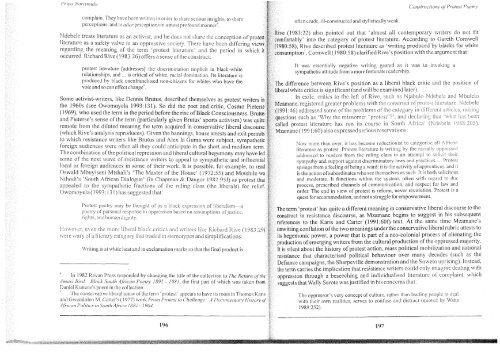Shane Moran - Alternation Journal
Shane Moran - Alternation Journal
Shane Moran - Alternation Journal
Create successful ePaper yourself
Turn your PDF publications into a flip-book with our unique Google optimized e-Paper software.
coti-iplain. They have beer1 writtzn in oriler. to sllarc serio~rs illsights, to sllasc<br />
pcrceptio~is. ant1 to alter pesccptions ill a mosl proft~~iritl 1jr21111cr'.<br />
1Udehele treats literature as an activist. nrld he does not :;i~art: thz ccllrception ofprot<br />
literalure as a safety valve iii an oppressive s!,cic;g. *firt.rc I;ave beel? differing vie<br />
regarding the meaning of ihe term 'protest litei-a1rr.c' and the perioci ill which<br />
occull-ed. Richard Rive (1953:26) offers a serlsc of t!le coxsiruct:<br />
often crude. ill-cons~l-ucted aticl stylistically wcak.<br />
1953:22) also pointed out that 'almost all conteinporaiy writers do not tit<br />
rtably' into the category of protest literature. According to Gareth Cornwell<br />
:55), Rive described protest literature as 'writing produced by blacks for white<br />
mption'. Cocllwell (I 980:58) clarified Rive's position with the argument that:<br />
protest literature [adtiresses] tlie disci.iniination irllplicit ill black-whiie<br />
relationsiiips, and ... is critical of white. racial dot~iination. Its literature iq<br />
~~~ .<br />
produced hy black unenfranchised non-citi~ens for wiiites who llave the<br />
vote and so can effect change'.<br />
It was essentially negative writing geared as it was to invoking a<br />
sympathetic attitudc from amore fortunate readership.<br />
ellee between Rive's position as a liberal black critic and the position of<br />
ite critics is significant (and will be examined later).<br />
Some activist-writers, like Dennis Rrutus, described theinselves as protest writers<br />
n exile, cl.ilicS to lefi of Rive, such as Njabulo Nd:!i~i~ and Mbi:i~ii~<br />
the 1960s (see Owornoyela 1993:131). So did the poet and critic, Coslno Pieter<br />
(1 969), who used the term in the period before the rise of Black Consciousness. R<br />
and Pieterse's sense of the term (pal-titularly given Rrutus' sports activism) was<br />
remote from the diluted meaning the term acquired in conservative liberal di<br />
(which. Rive's analysis reproduces). Ciiven the bannings, - house arrests and exit<br />
to which resistance writers like Brutus and Alex la Gutna were subject, syml;athe<br />
foreign audiences were often all they could anticipate in the sl?ort and ~nediurn tet<br />
The combination of the polirica! repression and liberal cultural hegemony may have<br />
some of the next wave or re'sistance writers lo appeal lo spnipathetic and inflrle~l<br />
local or foreign aufliences in some of their work. It is possibie, for example, lo rea<br />
Oswald Mbuyiseni Mtshali's The Master wf the House' (197255) and Motshile w<br />
Nthodi's 'Soout hr?;frican Dialogue9 (in Chapman & Dangoi. 19X2:95f) as protest t<br />
appealed to tile sympathetic fractions of tlre ruling class (ihc liberials) for re1<br />
. ~<br />
11.45) addressee] solilt: of like proble!ns of:!?? category iti :!itf'c;r:?~?i ,ti'tlr:i-s, raisi!~,;<br />
tiolls sUdr as "Why Itle illisno17ie~ "p:-o!&"?'. and t~ec~ar~i;ri!, that. 'i~li:;l: ::>I:: t:!:Ci:<br />
d prolest literature has ~~111 course ii-i SOEI~ ,Af~-iclil' jNi/c/iel~ i'!SX:?:I5).<br />
Inane ( I 9") 160) aiso expressed serious rcservatioi~s:<br />
'No!\, 1llore tilarl ever. it Iias becon~e i.cdi~c!iorrist lo crolegorisc all Africa11<br />
literature as protest. Protest literaturc is writing by tilt racially O!~l?!c~'X::!<br />
acldr.esst;d to readers from the ruling class in an attcmpi to solicit tiieir<br />
sympatl~y and suppori against discriminatory laws and ~ractices .... Protest<br />
spl-ings from a feeling of being a ward: it is tlie activity ofapprcniiccs. and it<br />
is tlre action ofsubordi~iales wiio see themselves as such. Jt is both solicitou:;<br />
and moderate. It functions witlii~~ tile system. often wit11 regal-d to due<br />
process, prescribed chanticls of communication. and I-espect for- law aid<br />
~w~lno)ie!a (1 993: I3 1) has silggest.cd lilal:<br />
order. The end in view of protest is reform, never revolution. Protest is 3<br />
quest for accommodation, and not a struggle for empowerment.<br />
Pl.otest poetl-y may be thrjugiit ciF its a hl;lck cupr.cssi(>n of [;beraiisrrl-~-a<br />
POCfrY of pcrscllai respollse to o]>pre";io" [~;li;eti 011 ass!!illptiolls ofjus[icc.<br />
rif~hts, mci hi:i~l;!~i diz~-iity.<br />
e term "rotest' has quite a different meaning in conservative liberal discourse to the<br />
nstruct in resistance discourse, as Mzamane begins to suggest in his subsequent<br />
rences to the Karis and Carter (1991:60f) text. At the same time Mzamane's<br />
like ~ i ~ j ~;li.>,~ ~ ~ (1983:~ ~ . d ittil~g conflation of the two meanings under the conservative liberal rubric attests to<br />
. .<br />
llol-i.cv::,r, ever1 the iliori:. iibryai bjz(;k cl.iilis ;.ll:d v
















